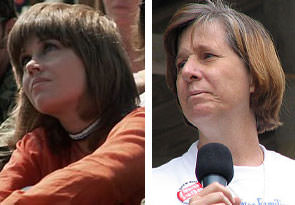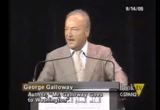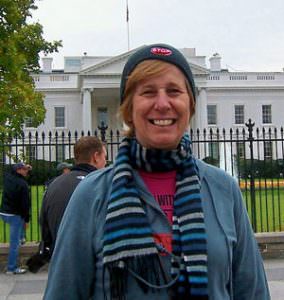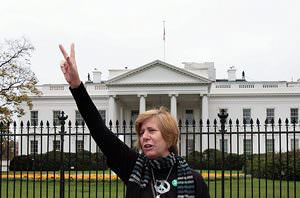Marie Cocco: The Hippie Factor
Tempting though it may be to lump them together, Baghdad is not Saigon, and Cindy Sheehan is not Jane Fonda.
Tempting though it may be to lump them together, Baghdad is not Saigon, and Cindy Sheehan is not Jane Fonda.
WASHINGTON — Iraq is not Vietnam.
This may disappoint those repulsed by George W. Bush’s Nixonian penchant for deception and his ruthless political cynicism. But it does not alter the essential fact. The catastrophic American invasion of Iraq and the catastrophic American entanglement in Southeast Asia have never been one and the same.
I cannot predict whether the new Republican battle cry — that somehow a foiled terrorist plot to blow up airliners means American voters should endorse the Iraq misadventure and punish Democrats who seek an orderly end to it — will work in the November congressional elections. Politically speaking, it suffices that Republicans in their hearts believe it will work. Otherwise, the coordinated screeching of the theme would not now be heard.
The political lesson the Republican Party took from Vietnam was that the charge of “cut and run” could be unerringly effective, even if the president who did the cutting and running from Saigon was, in fact, Republican Richard Nixon. But here is where the essential differences between the two wars complicate the counterfeit argument: The political origins of the conflicts were fundamentally different, as was the opposition that grew up around them.
American involvement in Vietnam was not the result of some newfangled doctrine cooked up by a small but influential group of partisan insiders. It was, at the start, a logical extension of the policy of containment — that the United States would deter what it saw as the global march of Soviet-style communism anywhere in the world. The notion of containment was bipartisan, had broad support among the public and was unquestioned for decades after World War II.
Containment was pursued through the Vietnam era by Democrat Harry Truman, Republican Dwight Eisenhower and Democrat John F. Kennedy, then by Democrat Lyndon B. Johnson and Republican Nixon. Bush can claim no such history of consensus or bipartisanship on Iraq.
The consensus about Iraq, when the administration was first hatching the idea of an invasion to topple Saddam Hussein, was that United Nations sanctions had worked to prevent the Iraqi dictator from enhancing his military capability. Secretary of State Colin Powell said so, publicly and repeatedly, through much of 2001. So did then-National Security Advisor Condoleezza Rice. Most famously, so did Vice President Dick Cheney: “Saddam Hussein’s bottled up,” he declared during a Sept. 16, 2001, interview on “Meet the Press.”
Containment was the world’s policy toward Iraq. Bush disrupted it with his new doctrine of preemptive war. The new policy shattered a long-standing, bipartisan consensus in Washington on the use of American military force. The soft-on-terrorism smear that Bush then used in 2002 against any Democrat who disagreed, however minutely, with any aspect of the Bush war policies deepened the divide.
It is, though, not nearly as ugly as the national trauma over Vietnam. Why? No hippies.
Can anyone disentangle the political turmoil churned up by Vietnam from the other cultural upheavals of the era? The provocative newsreel that was the 1960s and ’70s featured unending film footage of civil rights protests and the violence that often accompanied them; of young women discarding sorority pearls and demure sweaters for love beads and T-shirts; of young men who grew their hair as long as young women — and burned their draft cards to boot.
The shattering of racial and sexual taboos and the barriers that fell, one quickly after another, gave Americans the impression of a society upended, as indeed it was. When Nixon appealed to a “great silent majority'” in 1969, a majority of Americans already had turned against the Vietnam War — about half were calling it morally indefensible; nearly two-thirds told pollsters it was a mistake. So it is impossible to imagine a “silent majority” of Nixon supporters who somehow focused on Vietnam but not on street riots, rebellious blacks and the sense of a society in chaos.
Today the faces of the movement against the Iraq war do not resemble Jane Fonda or Stokely Carmichael. They are the innocuous images of Connecticut’s Ned Lamont, the preppy-looking businessman who defeated Sen. Joe Lieberman in the state’s Democratic primary, and Cindy Sheehan, a middle-aged mother whose son was killed in Iraq. Republicans try, nonetheless, to demonize them. The task is difficult when those supposedly belonging to a dangerous fringe look as bland as a neighbor you might bump into at the grocery store.
It is harder, still, when the protest movement isn’t unfolding in the public glare of television cameras but in the privacy of the voting booth.
Marie Cocco’s e-mail address is mariecocco(at symbol)washpost.com.
Your support matters…Independent journalism is under threat and overshadowed by heavily funded mainstream media.
You can help level the playing field. Become a member.
Your tax-deductible contribution keeps us digging beneath the headlines to give you thought-provoking, investigative reporting and analysis that unearths what's really happening- without compromise.
Give today to support our courageous, independent journalists.






You need to be a supporter to comment.
There are currently no responses to this article.
Be the first to respond.